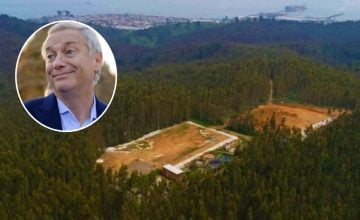During a visit to Chile by European Union directors Cristina Lobillo — Energy Security and International Relations — and Stefano Signore — European Green Deal and Digital Agenda — officials in Santiago held the launch ceremony for the Mirador Copernicus.
The initiative, led by the EU Delegation in Chile, the Museo Interactivo Mirador, the University of Chile and Parque Metropolitano — with support from the Copernicus Regional Center for Latin America and the Caribbean — aims to bring the EU’s Copernicus Earth observation data closer to the public.
The space will offer an immersive experience that explains how satellites and space technologies contribute to monitoring the planet. A key element will be support from CopernicusLAC Chile, ensuring the scientific rigor of all content.
The event took place at the future site of Mirador Copernicus (formerly Vista Santiago), on Cerro San Cristóbal in Parque Metropolitano, where an interactive room is expected to open to the public in 2026.
The ceremony also confirmed the arrival of cutting edge equipment that boosts CopernicusLAC Chile’s capacity to store, process and distribute Copernicus satellite data, strengthening its role as a regional pillar for Earth observation information and applications.
According to organizers, this new high capacity, AI enabled infrastructure will expand the development and distribution of value added services; provide the region with open tools for ecosystem monitoring; support the storage and delivery of Copernicus satellite imagery dating back to 2014; serve as a regional geospatial data platform; and energize startups built on Earth observation services.
Business Incubator
Finally, the creation of the forthcoming Copernicus Business Incubator was announced, developed together with OpenBeauchef, the innovation and entrepreneurship center of the Faculty of Physical and Mathematical Sciences (FCFM) at the University of Chile.
The project aims to promote innovative solutions and startups powered by Copernicus data across Latin America and the Caribbean. It includes an estimated 2 million euros in European funding and a planned launch in 2026.

El Ciudadano










